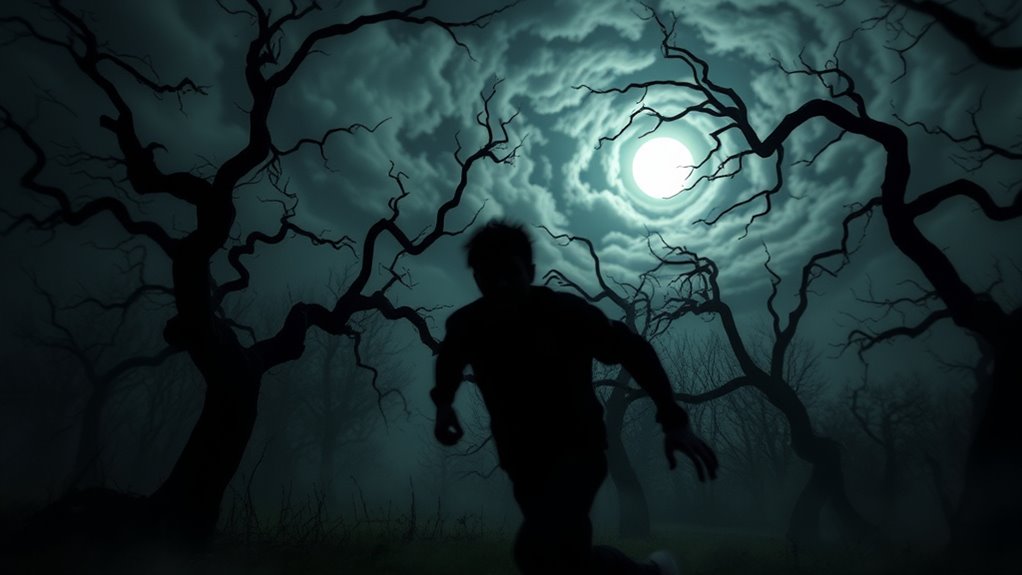When you’re chased in a nightmare, your subconscious is revealing underlying fears and unresolved conflicts. This fear often activates your fight-or-flight response, creating intense emotional reactions despite knowing you’re safe. The pursuer may symbolize aspects of yourself you’re avoiding or fears of losing control. These dreams serve as messages from your mind, highlighting issues that need attention. If you’re curious about what your dreams might mean, explore how they could help you understand your deeper emotional landscape.
Key Takeaways
- Chase dreams often symbolize unresolved fears or emotional conflicts rooted in subconscious anxieties.
- The pursuer represents aspects of oneself being avoided or suppressed, signaling a need for self-reflection.
- Such nightmares activate primal survival responses, highlighting feelings of helplessness and vulnerability.
- They serve as warnings that ignoring underlying issues may intensify emotional stress or overwhelm.
- Recognizing these dreams can help address personal conflicts, reducing their frequency and promoting emotional well-being.

Nightmares often feel like vivid, unsettling stories that play out in your mind while you sleep, but their roots run deep into our psychology. When you’re being chased in a nightmare, it’s not just a random story; it’s a reflection of your inner fears and the way your mind processes threat. The fear response kicks in during these moments, activating your fight-or-flight mechanism as if danger were real. Even though you know intellectually that you’re safe, your subconscious fears take over, making the chase feel urgent and terrifying. This intense emotional reaction isn’t accidental—it’s your mind’s way of highlighting unresolved issues or anxieties you might not consciously acknowledge.
Being pursued in a dream taps into primal survival instincts that are hardwired into your brain. When you’re running from an attacker or some shadowy pursuer, your brain interprets this as a threat to your safety, triggering automatic responses designed to protect you. The subconscious fears that often surface during these dreams could relate to real-life situations where you feel vulnerable, overwhelmed, or out of control. These fears might involve personal relationships, work stress, or feelings of inadequacy. Your mind uses the chase as a symbolic representation of these underlying concerns, making the experience feel visceral and immediate. Additionally, recent research into psychological responses to nightmares**** suggests that such dreams serve as a mental space to process unresolved emotional conflicts.
Chase dreams reflect deep fears of vulnerability, stress, and unresolved conflicts lurking in your subconscious mind.
The sensation of being chased is also linked to feelings of helplessness or avoidance. When you turn to run, you might notice a sense of powerlessness, which underscores the emotional weight of your subconscious fears. The pursuit can represent an aspect of yourself that you’re trying to escape or suppress—an unresolved conflict or anxiety that’s lingering beneath your conscious awareness. The more intense the chase, the more your mind is urging you to confront whatever it is you’re avoiding. These nightmares often serve as a subconscious reminder that ignoring your fears won’t make them disappear; instead, they may manifest as a relentless pursuit in your dreams.
Understanding this connection can help you make sense of why these nightmares occur. They’re not just random episodes of fear but a window into your subconscious world. Recognizing the roots of your chase dreams as manifestations of subconscious fears allows you to explore the underlying issues in your waking life. Addressing these concerns directly, whether through self-reflection or seeking support, can reduce the frequency and intensity of nightmares. Ultimately, your mind uses these vivid scenes to communicate important messages—warning signals that it’s time to confront what you’ve been avoiding.
Frequently Asked Questions
Can Recurring Nightmares Indicate Underlying Mental Health Issues?
Recurring nightmares can suggest underlying mental health issues, as they often reflect unresolved emotional conflicts. You might notice dream symbolism that points to subconscious fears, revealing what you’re avoiding or struggling with. These persistent dreams could be your mind’s way of processing stress or trauma. If they happen frequently, consider talking to a mental health professional to better understand what your dreams are trying to tell you and find relief.
How Do Cultural Differences Influence Nightmare Interpretations?
You might notice that cultural differences shape how you interpret nightmares. Cultural symbolism plays a significant role in dream interpretation, influencing the meanings you assign to recurring themes or symbols. For example, a snake might symbolize danger in one culture but healing in another. By understanding your cultural background, you can better grasp the personal significance of your nightmares and explore their messages more deeply.
Are Children’S Nightmares Different From Adults’ in Psychological Terms?
Imagine your mind as a garden; children’s nightmares are like young saplings, full of vivid, raw dream symbolism that reflects their rapid child development. You’ll find these dreams often more emotional and less structured, unlike adults’ more complex narratives. As a gardener, you notice that children’s nightmares serve as early tools for emotional growth, while adults’ dreams symbolize deeper, layered subconscious thoughts, shaping their understanding of life’s challenges.
What Role Does Sleep Quality Play in Nightmare Frequency?
You might notice that poor sleep quality increases your nightmare frequency. Sleep deprivation can cause your brain to process stress differently, leading to more vivid and frequent dreams. When your sleep is disrupted, your dream recall sharpens, making nightmares more memorable. Prioritizing good sleep hygiene helps reduce nightmares, as restful sleep promotes emotional regulation and lessens the likelihood of disturbing dreams.
Can Therapy Effectively Reduce Nightmares Involving Pursuers?
Ever wondered if therapy can quiet those relentless pursuers in your nightmares? It can. Through techniques like trauma processing, therapy helps you reframe disturbing dream imagery, reducing their intensity. As you confront underlying fears and unresolved issues, the chase loses its power. With patience and guidance, you might find that those haunting pursuits fade, replaced by calmer nights. Yes, therapy can make a real difference in breaking the cycle.
Conclusion
Understanding why you’re chased in nightmares reveals a lot about your subconscious fears. Nearly 70% of adults experience at least one nightmare annually, often involving a pursuer. This suggests that feeling chased isn’t just a random scare—it’s a reflection of unresolved stress or anxiety. Recognizing these patterns can help you confront your fears and find peace. Remember, your mind’s way of signaling unresolved issues is a powerful tool for self-awareness and growth.










